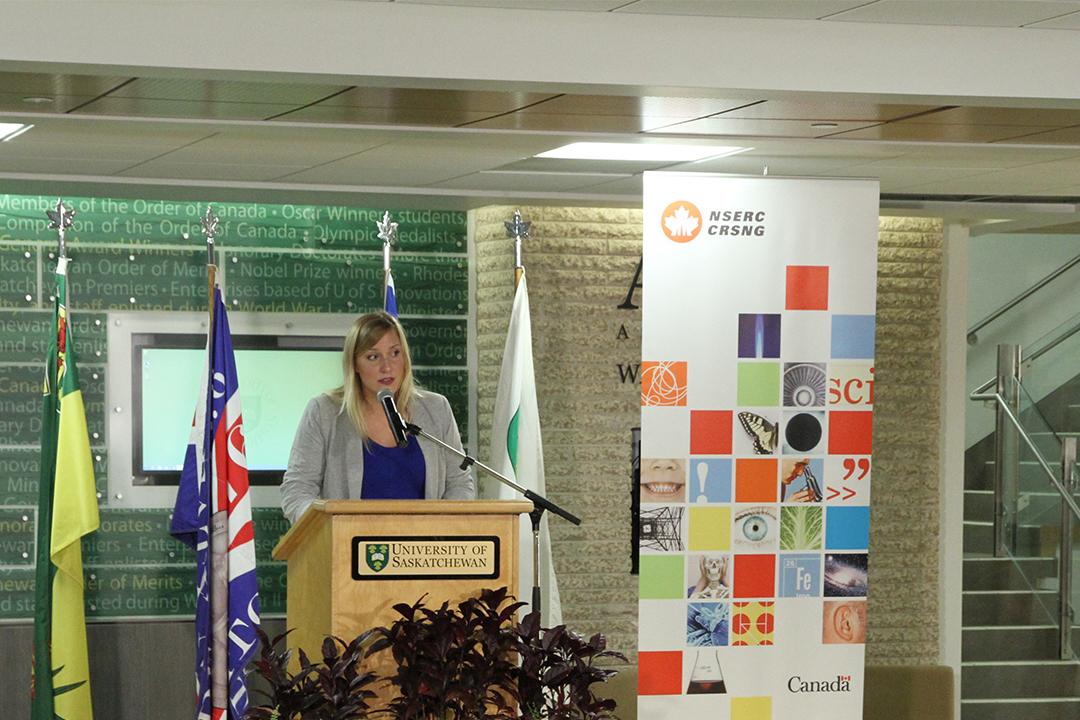
Cowan takes road less taken toward veterinary career
While most prospective veterinary students feel acceptance into the Western College of Veterinary Medicine (WCVM) is an offer that they dare not put off, Vanessa Cowan felt it was an offer she had to delay.
By Kathy FitzpatrickIn 2016, Cowan decided to defer her acceptance to the college’s four-year veterinary program — an option that’s available to successful applicants. Instead, the Saskatoon resident is on an exciting path in research — a path she hopes to eventually merge with one in veterinary medicine.
Cowan is a PhD student in the WCVM’s Department of Veterinary Biomedical Sciences — one of 158 graduate students who are studying at the veterinary college. Through her program, she’s working with bulls and looking at the effects of ergot alkaloids (a type of mycotoxin) on their reproduction and breeding soundness.
Mould produces ergot alkaloids in grain and grasses, Cowan explains. When animals eat feed that’s contaminated with ergot, they get sick. They may also become infertile or sub-fertile.
“Any sort of production animal — it’s kind of a finely tuned machine,” she says. “You want to maximize the production of that animal. Mycotoxins certainly throw a wrench into that. So it’s pretty cool to be kind of on the forefront of that research in Canada.”
Through the course of her research, Cowan is looking for links with infertility – examining the possible effect of ergot on bovine reproductive hormones, testicular thermoregulation and sperm production. Since ergot alkaloids are vasoconstrictive, they could potentially impair blood flow to the testes. As a result, the mycotoxin could reduce the bulls’ sperm production and quality.
How to mitigate the effects is another pressing concern in the cattle industry, Cowan notes.
“I don’t think the results are going to be that they can’t have any ergot in their feed, but hopefully, we can detect a concentration … in their feed that’s acceptable,” she says.
The research is an unusual opportunity for someone who spent her life in Saskatoon and has never worked with large animals before.
“I don’t think you could have told me that this would be where I would be. And I don’t know if I would have believed you,” Cowan says.
Her route began at the University of Saskatchewan as an undergraduate in the College of Arts and Science with an undeclared major. She was soon drawn to toxicology — the practicality of applied science appealed to her, she says.
Cowan got her Bachelor of Science degree and is now working on her PhD degree in toxicology. She credits the mentorship she received from her supervisors — WCVM professors Drs. Barry Blakley and Jaswant Singh — for leading her into research.
***
While Cowan’s path is unique, a career in research is becoming a more attractive option for veterinary students — before or after graduation. Four veterinary students are currently enrolled in the college’s joint DVM/graduate academic program and working on master’s or PhD degrees while attending veterinary school.
Each summer, about 30 veterinary students – more than 10 per cent of the eligible student body – work alongside a faculty member on a research project and participate in the WCVM’s longstanding Undergraduate Student Summer Research Program.
It’s a chance to “dip their toes in the water and try another aspect of veterinary medicine that they wouldn’t otherwise be able to get if we weren’t doing it here,” says Dr. Chris Clark, associate dean (academic) at the WCVM.
This successful summer program has helped to spark students’ interest in research. As well, the college’s DVM curriculum offers multiple opportunities for students to get involved in research — including research elective courses in their third and fourth years. For some students, that early exposure to research convinces them to pursue combined graduate-residency programs.
***
Cowan is eager to fill the gap in published information on ergot contamination — a growing problem in Canada. So far, most of the peer-reviewed research literature comes from the United States and Europe, she says. This summer, she also looked at the pharmacokinetics of ergot alkaloids in cows (how the substance moves through the body) — a research topic that she proposed.
Cowan believes veterinary training will give her a better understanding of animal physiology, aiding her research. She has secured her spot in the DVM program’s Class of 2022 — becoming a first-year veterinary student in 2018.
Cowan’s decision to delay entry into the WCVM was a tough one. She’s in her eighth straight year of post-secondary education and going into veterinary medicine will add another four years to her academic career. But Cowan wants to complete most of her research before that next step because she knows how demanding the veterinary medicine program is.
It’s still too soon to tell where she will land when she finally emerges with a PhD degree in toxicology and a DVM degree, but Cowan foresees a career combining teaching with research or clinical work.
